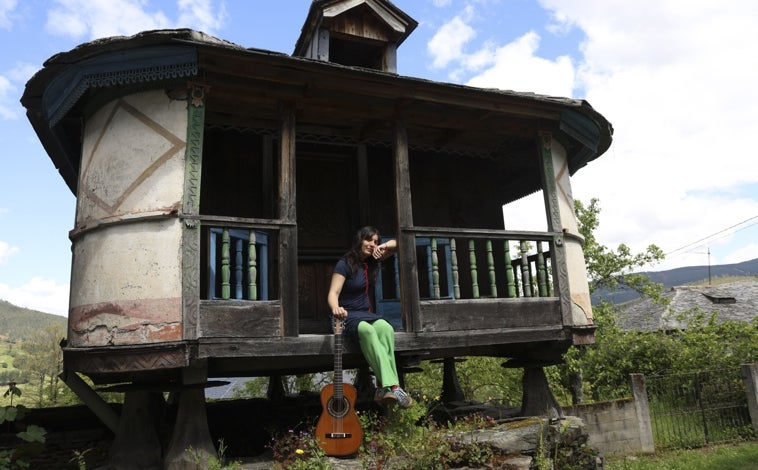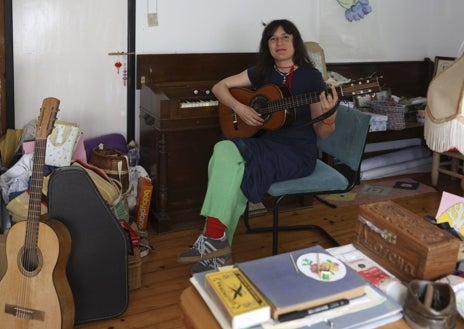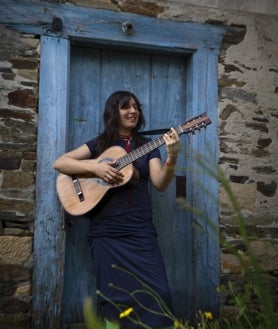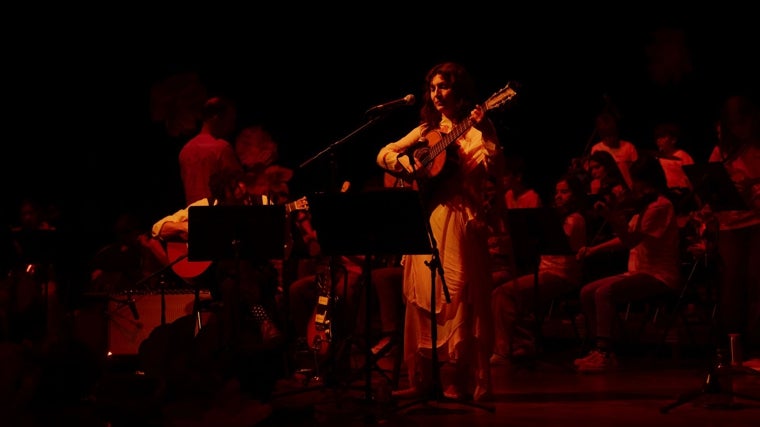Travel to Portugal with Lorena Álvarez: "I sacrifice a lot to make a living from my music, but I don't suffer anymore."

About six years ago, Lorena Álvarez (San Antolín de Ibias, Asturias, 1983) had one of her crises. "Another one, because I've had many," the singer-songwriter admits with a laugh during a trip to Porto with ABC Cultural. "I didn't really know what to do with my life. I spent the day thinking: 'My God, I have nothing! What am I going to do? I should sing better and learn to play the guitar better. I should have so many more things than I have at this point in my career.' At that time, I also didn't have the support of a record label, as has happened to me in recent months since I decided to leave my last one, nor money to record in a studio," the Asturian admits.
In that "low moment," he focused on a drawing that has stayed with him in every house he's lived in in Granada, Madrid, and Asturias: "My grandmother made it for me years ago, before she died, when she was already very old. I insisted a lot, and in the end, she agreed. It's very simple, like a stick figure, because she couldn't draw. It shows me playing the guitar, next to a tree, a flower, and a sun. I looked at it again and suddenly thought: 'That drawing shows everything I am! I don't need anything I think I need. I have my guitar, and that's enough,'" he recalls.
That revelation swept away all her ghosts in one fell swoop and restored her inspiration. Like everything important that happens in her life, good or bad, she turned it into a song, "La nube," from her album "Colección de canciones sencillas" (Elsegell), which ABC critics chose as the best of 2019. She sang: "And with this simple drawing / that's been hanging on my wall for so long / made me open my eyes / and understand what I didn't understand / How could she see me like that / when I didn't even see it."
The truth is that Lorena Álvarez has always been that girl from San Antolín with the Spanish guitar, ever since she released her first album, 'La Cinta' (Sones), in 2011. Actually, it was a cassette with seven tracks in an edition that included a booklet with the chords and a Walkman to listen to them. Quite a daring move for a debut that seemed to sabotage its own projection. "Throughout my career, I've done a lot of things that aren't very normal, to be honest," she says, laughing again, this time out of nerves, as there are only two hours left until she takes the stage at the Espinho Auditorium , where she's going to stage another of her crazy acts. One of those that some musicians around her wonder how she managed to pull off.



With ABC Cultural as a witness, this free-form artist within traditional Spanish music, who has crossed the boundaries of folklore and won the hearts of a part of the national indie scene—"and I'm not at all interested in indie, I've never liked it"—is going to present his next album with an orchestra of 65 children: the Benjamim Project . And not in Spain, but in this town in Portugal 40 kilometers from the capital. Song by song and in album order, although at the time of the performance he doesn't even know where or how he's going to publish it. Another crisis, although shortly before sending this issue to the press, the singer-songwriter calls us and reveals that, finally, it will be on Montgrí , the label set up by the group Cala Vento, which includes names like Lagartija Nick and Biznaga . After months of delay, it will finally be released in the fall, "possibly in October."
"Music has brought me many joys and also many headaches in my life, but, without a doubt, this concert is the most beautiful thing I've done to date. My prayers have paid off," she confessed on Instagram before her two sold-out performances in Espinho on consecutive days. "I feel like they always have me in mind for the strangest ideas, ideas they wouldn't count on other musicians for because they know I'm always open and excited. For me, the pinnacle of music is sharing it with other musicians," she says.
—The children keep hugging her and coming up to her to tell her things, as if they've known her all their lives...
—I guess they see that I'm very involved in the project and that I also open up to them, which makes them feel comfortable. The other day, a girl came up to me at rehearsal, asked if she could hug me, and started crying. I asked her, and she told me she was going through a hard time and that my music had helped her a lot. That it made her feel a lot of things and, above all, gave her peace of mind. She was very emotional and… Well, that makes sense of it all.
 Lorena Álvarez, during her concert in Espinho
Pablo Ortega
Lorena Álvarez, during her concert in Espinho
Pablo Ortega
The truth is that Álvarez has plenty of curious adventures. Over the course of five albums and an EP, she has collaborated with various choirs, recorded with a wide variety of Spanish folk groups, and toured with artists such as Julieta Venegas, Julio Bustamante, Soleá Morente , and Nacho Vegas. The latter even composed a song about her, "Rapaza de San Antolín," which he included on one of his albums. The lyrics compare her to Lola Flores and describe her arriving at a party "whistling a cumbia villera with her rustic tropical look," followed by a municipal band with whom she is "redefining modernity."
The Asturian composer recalls that in 2013 she gave a concert for donkeys in the Adebo reserve in Córdoba, where this heiress of Vainica Doble and Gloria Fuertes sang one of her songs: "If the love I put in you / I had put it on a donkey / I would have ridden it / and traveled the world." A month ago, she also traveled to Morocco with Antonio Arias. The leader of Lagartija Nick and one of the brains behind Enrique Morente's revolutionary "Omega" was on tour with Mawlid , his project with Gnawa musicians inspired by religious songs and Islamic spiritual rhythms.
Arias tells ABC Cultural that, at first, the singer-songwriter was only going to see a couple of concerts, the one in Tetouan and the one in Tangier: "In the end, she hopped in the van for the entire tour and brought the joy and strength we were missing. She brought all that self-confidence! What I value most about Lorena is the temperament with which she carries her career, that strong commitment to her way of doing things... With her freedom! And how she manages to get involved in all kinds of projects. She's very brave, within that traditional vision that sets her apart from other artists. She's a restless soul ."
—When did all that passion awaken?
—As a child, I didn't think, "I'm going to dedicate myself to music," but I always had that drive and dedicated my life to it. I remember when I was a child, I asked my parents for a guitar and taught myself. I spent hours playing two chords. The first tape I had was by Joan Baez, but I didn't listen to anything beyond that because culture in general wasn't available in my town and the radio wasn't very well received. Later, I discovered Los Chichos, Los Chunguitos, and Camela, but also Bob Dylan through my uncle. My parents aren't involved in anything related to music either; they own a car repair shop.
—And you ended up leaving San Antolín?
—Yes, when I was 16, but I always end up coming back. I went to Oviedo to study at the Art School because my town is very small and only had high school up to that age. It's a village in the most isolated area of Asturias, on the border with Galicia and León. Getting there is difficult; we've always had very bad roads. That isolation, which is a drawback, has been an incentive for me to return and settle there, because the town has remained intact. From the traditional architecture to the customs. For me, it's like a sanctuary, far from everything.
—No gentrification…
—Nothing! There must be so much gentrification there! [Laughs heartily] No way... Nobody goes there. There are less than 200 of us. We don't have those problems. —But there was a moment when you made the decision to dedicate yourself to music. —It was a gradual thing, although I was always clear that I didn't want to dedicate my life to something that felt like a waste of time and would depress me. Once I made up my mind, I didn't want to work on anything else, despite the difficulties I might encounter, so I fought to make this my way of life.
—Was the fight tough?
—Yes! [laughs]. It's said that when a person has a sensitivity, they also have to have a lot of strength to maintain it and navigate this world, especially in music, where it's difficult to make a name for themselves. In reality, what I want is to build my own space where I feel comfortable, even if it's small, but when you want to make a living from it, it gets complicated. Making that commitment doesn't mean everything will be wonderful. Lately, I've been thinking about the image many artists convey of having an ideal life. For me, it's not like that. It's a life with such a strong commitment that it's as if I have to start over every day. Many musicians can't stand that life... It's hard, of course.
—Isn't everything ideal in the 'underground'?
—No. Independent record labels often have worse conditions than multinationals, and they don't have the resources or the money to do things. The music world is in disarray. I think we need a generational shift, younger people in cultural management, because the world has changed. I feel there are many exploitative relationships toward artists.
—That's a harsh statement.
—I know, but the other day I watched Aitana's documentary, 'Metamorfosis,' and I was horrified by what it showed. How can there be people working with artists who don't respect their way of making music and the rest they need to keep creating? There's a lot of abuse in the industry, and that has to change.
—Is that why you go to a record label almost per album?
—Yes, I really do! [laughs] I've spent my whole life trying to find a team of people with whom I'm aligned in my understanding of music, but I haven't had any luck. I'm not willing to compromise my art for anything in the world, so I have to keep looking.
—Have you ever committed to the dates that the industry usually imposes?
—Never. I don't release an album every year, but when I have something to say. I need to have experienced things and have time to digest them and turn them into a song. I don't want to compromise that either, because that would kill my creative side, which is sacred.
—What has happened since your previous album in 2021 that you need to share in the new one?
—Losing power over myself and regaining it. A journey from the lowest point to the highest point. It's something that happens to women time and time again. We give it away to our partners, families, and friends, only to regain it and lose it again. And I wanted to tell you something else, but I forgot... I'll get around to it. Anyway, it's about regaining power over yourself to make your own decisions. Oh, I remember now! I was going to say that I'm happy because it's an album where I've found a slightly more feminine language, something that didn't happen on my other albums, where it seemed like my songs were always reacting to something, like being angry and aggressive, even if it was through humor.
—When did you lose control?
—Four years ago. There came a time when I needed to stop. For me, making music or art is also about managing the timing of your life. You have to pay close attention to what your body asks of you, and for me, it asked me to disappear. In my case, to nature, that's why I returned to San Antolín.
—In one of the new songs I was rehearsing with the kids today, I sang: "I had to go back to my hometown to rest, because I couldn't take it anymore / I had to, with great regret, cancel the concerts / I had to forget about drinking and smoking / I had to forget about everything." Was it so abrupt?
—Yes, I gave it all up. I spent a while just meditating, walking in nature, and recovering. Recovering my connection with the purpose of making music, which is something that can be lost over the years. On other occasions when I've also lost that connection, I kept going as best I could, but at that moment I said no. I constantly see musicians around me who aren't feeling well, yet they keep going, carrying on with increasing pressure. That's unhealthy and causes depression and other mental illnesses. I see it a lot around me.
—Were you also looking for solitude when you returned to the village?
—Well, actually, I grew up in San Antolín and spent a lot of time alone. Now I've set up a studio in a house a neighbor let me, where I also spend a lot of time alone composing.
—Does your return to San Antolín have nothing to do with the impossibility of making a living from music in Madrid?
—It's not that I want to live in the city, but it's true that if you're dedicated to art and want a space to work and free time so you don't have to force that creativity, it's very difficult in Madrid. There's little space available and it's expensive. You need a lot more money and resources. That's why I prefer my hometown. If I were making trap, I wouldn't have come to live in San Antolín [laughs]. Every artist looks for their inspiration in a certain place, and to find it, I need silence.
—At what cost have you managed to make a living from your music?
—At the cost of… I don't know how to put it… [She pauses for a long time, searching for the right words.] To be able to live off my songs without having to make any compromises, I've had to cut back as much as possible on my expenses and… I don't know, there are many things I give up for this way of life, but I don't really consider others a sacrifice, to be honest. There's the traveling, being very tired, and going through all sorts of moods, but if I take stock, I don't suffer as much giving that up anymore.
—Is it a more material or spiritual sacrifice?
—Both. I could have a more stable job and earn more money, which are things I don't have, but I don't need them either. As for moods, I could also have a more stable life, because I go through periods of loneliness and others where I feel lost and scared. Sometimes, I have periods of joy and am surrounded by lots of people. These are extreme, ever-changing states that I probably wouldn't have in another life, but those bad times are sacrifices I gladly make to pursue what I love.
—Do you remember the time you earned the most for your music?
—Yes, I remember it very well! [laughs] I won't tell you how much I earned, but I will tell you how. A few years ago, a British company called me to do the soundtrack for a video game ['Alba, A Wildlife Adventure']. Not only was it by far the highest paid I've ever been, but it was also the most comfortable time I've ever worked, with a very legal contract. It's very different from what happens in Spain, where when you sign a contract, all they need to do is ask you to hand over your firstborn son. They're very abusive. I'll never get paid that much for a concert!
—Have you ever been plagued by the idea that you couldn't make a better living from your music, given that each new project of yours has a huge impact on Spain's major media outlets? I've even seen you on RTVE's Telediario.
—Sometimes, yes, honestly. What obsesses me isn't money, but having more opportunities when it comes to working. Things I don't have now, like someone to drive on tours, carry the instruments, or check the sound for me so I can go straight to the gig, but that's not possible. It doesn't matter, it is what it is. Maybe one day I'll be able to have someone carry my stuff [laughs], because all day loading and unloading, setting up and taking down, it's exhausting.
—His lyrics always tell of personal experiences, and some are really harsh, like 'If You Are My Man,' which talks about abuse.
—Yes. Everything I write about is about things I've experienced. There's a phrase I really like to define that: "With a burned hand, I write about the nature of fire" [attributed to Gustave Flaubert]. But I try not to dwell on the details, which nobody cares about, but rather to seek out the essentials to extract the lesson that can be useful to others.
—And you need the wound to close so you can sing?
—No. Sometimes singing about trauma helps heal it. I feel like art and music protect you from suffering bigger wounds; they act as a protective shield.
—I always thought your song 'Alba' also spoke of your grandmother, of how she was with her the night she died.
—Well, no, it's about albadas, songs sung at dawn when lovers said goodbye. That's the great thing about performances [laughs]. It's funny, because a man once wrote to me telling me that his partner had suffered a serious illness and, in the end, had passed away. He told me that in her final moments, they had listened to my music, and it had become something special to them. That song in particular comforted him greatly during that process.
ABC.es



%3Aformat(jpg)%3Aquality(99)%3Awatermark(f.elconfidencial.com%2Ffile%2Fbae%2Feea%2Ffde%2Fbaeeeafde1b3229287b0c008f7602058.png%2C0%2C275%2C1)%2Ff.elconfidencial.com%2Foriginal%2F9d3%2Fe01%2F370%2F9d3e013704fbfa121e3986bc684e0007.jpg&w=1280&q=100)